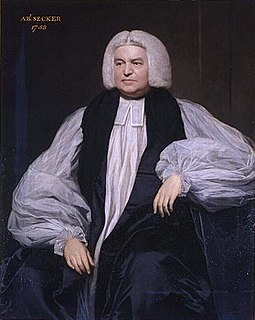A Quote by Jonathan Swift
Positiveness is a good quality for preachers and speakers because, whoever shares his thoughts with the public will convince them as he himself appears convinced.
Related Quotes
A Christian should put away all defense and make no attempt to excuse himself either in his own eyes or before the Lord. Whoever defends himself will have himself for his defense, and he will have no other. But let him come defenseless before the Lord and he will have for his defender no less than God Himself.
The Lord has given the Holy Spirit upon the earth, and in whomsoever He dwells, that one feels paradise within himself. You might say: why hasn't this happened to me? Because you have not given yourself over to the will of God, but you live according to yourself. Look at the one who loves his own will. He never has peace in himself and is always displeased with something. But whoever has given himself over to God's will perfectly has pure prayer. His soul loves the Lord, and everything is acceptable and good to him.
The Lord gave the wonderful promise of the free use of His name with the Father in conjunction with doing His works. The disciple who lives only for Jesus' work and kingdom, for His will and honor, will be given the power to appropriate the promise. Anyone grasping the promise only when he wants something very special for himself will be disappointed, because he is making Jesus the servant of his own comfort. But whoever wants to pray the effective prayer of faith because he needs it for the work of the Master will learn it, because he has made himself the servant of his Lord's interests.
Whoever relies on the Tao in governing men doesn't try to force issues or defeat enemies by force of arms. For every force there is a counterforce. Violence, even well intentioned, always rebounds upon oneself. The Master does his job and then stops. He understands that the universe is forever out of control, and that trying to dominate events goes against the current of the Tao. Because he believes in himself, he doesn't try to convince others. Because he is content with himself, he doesn't need others' approval. Because he accepts himself, the whole world accepts him.
Whoever is wise is apt to suspect and be diffident of himself, and upon that account is willing to "hearken unto counsel"; whereas the foolish man, being in proportion to his folly full of himself, and swallowed up in conceit, will seldom take any counsel but his own, and for that very reason, because it is his own.
Do not worry at all about negative thoughts, and do not try to control them. All you have to do is begin to think good thoughts each day. Plant as many good thoughts as you can in each day. As you begin to think good thoughts you will attract more and more good thoughts, and eventually the good thoughts will wipe out the negative thoughts altogether.
Teach your scholar to observe the phenomena of nature; you will soon rouse his curiosity, but if you would have it grow, do not be in too great a hurry to satisfy this curiosity. Put the problems before him and let him solve them himself. Let him know nothing because you have told him, but because he has learnt it for himself. Let him not be taught science, let him discover it. If ever you substitute authority for reason he will cease to reason; he will be a mere plaything of other people's thoughts.
The poet presents the imagination with images from life and human characters and situations, sets them all in motion and leaves itto the beholder to let these images take his thoughts as far as his mental powers will permit. This is why he is able to engage men of the most differing capabilities, indeed fools and sages together. The philosopher, on the other hand, presents not life itself but the finished thoughts which he has abstracted from it and then demands that the reader should think precisely as, and precisely as far as, he himself thinks. That is why his public is so small.
Whoever would entitle himself after death through the merits of his Redeemer, to the noblest of rewards, let him serve God throughout life in this most excellent of all duties, doing good to our brethren. Whoever is sensible of his offences, let him take this way especially of evidencing his repentance.
The good enough parent, in addition to being convinced that whatever his child does, he does it because at that moment he is convinced this is the best he can do, will also ask himself: "What in the world would make me act as my child acts at this moment? And if I felt forced to act this way, what would make me feel better about it?






































